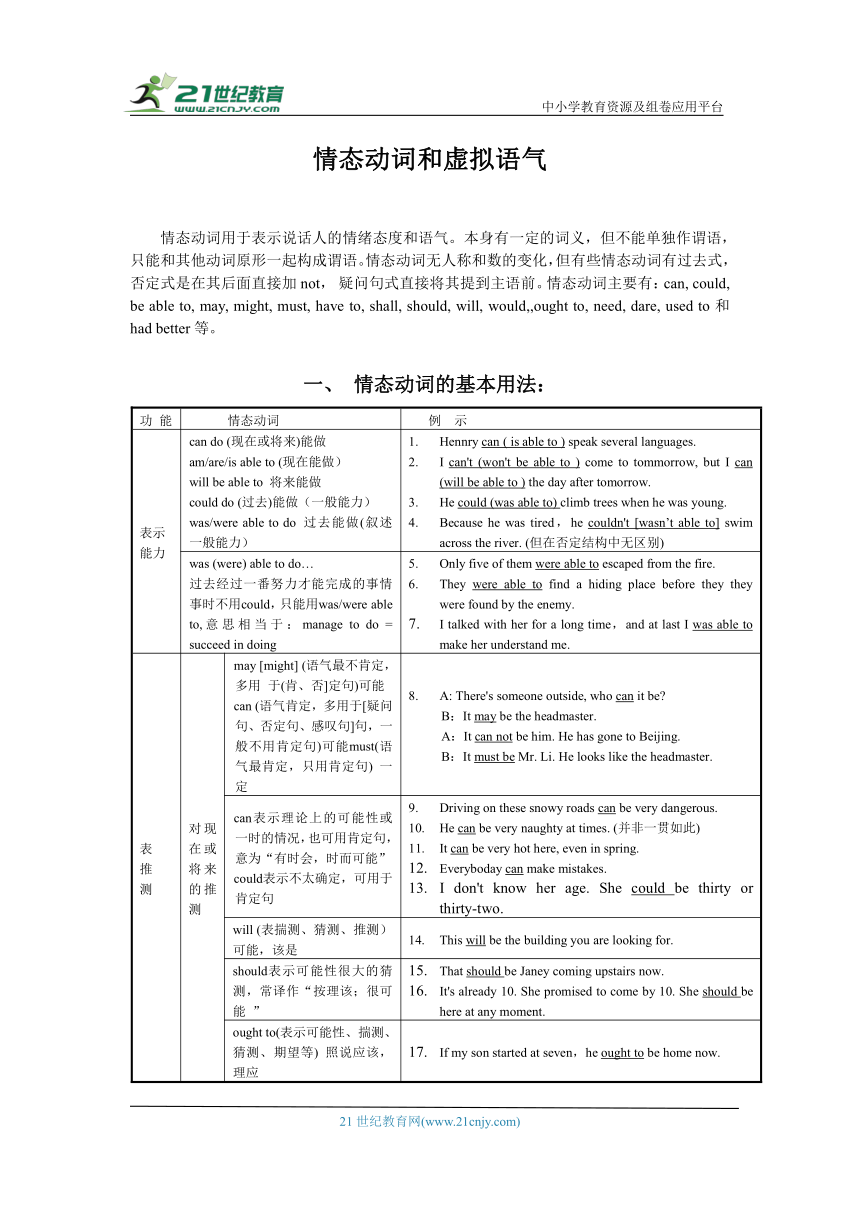
中小学教育资源及组卷应用平台 情态动词和虚拟语气 情态动词用于表示说话人的情绪态度和语气。本身有一定的词义,但不能单独作谓语,只能和其他动词原形一起构成谓语。情态动词无人称和数的变化,但有些情态动词有过去式,否定式是在其后面直接加not, 疑问句式直接将其提到主语前。情态动词主要有:can, could, be able to, may, might, must, have to, shall, should, will, would,,ought to, need, dare, used to和had better等。 一、 情态动词的基本用法: 功 能 情态动词 例 示 表示能力 can do (现在或将来)能做am/are/is able to (现在能做)will be able to 将来能做could do (过去)能做(一般能力)was/were able to do 过去能做(叙述一般能力) Hennry can ( is able to ) speak several languages. I can't (won't be able to ) come to tommorrow, but I can (will be able to ) the day after tomorrow.He could (was able to) climb trees when he was young. Because he was tired,he couldn't [wasn’t able to] swim across the river. (但在否定结构中无区别) was (were) able to do…过去经过一番努力才能完成的事情事时不用could,只能用was/were able to,意思相当于:manage to do = succeed in doing Only five of them were able to escaped from the fire.They were able to find a hiding place before they they were found by the enemy. I talked with her for a long time,and at last I was able to make her understand me. 表推测 对现在或将来的推测 may [might] (语气最不肯定,多用 于(肯、否]定句)可能can (语气肯定,多用于[疑问句、否定句、感叹句]句,一般不用肯定句)可能must(语气最肯定,只用肯定句) 一定 A: There's someone outside, who can it be B:It may be the headmaster. A:It can not be him. He has gone to Beijing. B:It must be Mr. Li. He looks like the headmaster. can表示理论上的可能性或一时的情况,也可用肯定句,意为“有时会,时而可能”could表示不太确定,可用于肯定句 Driving on these snowy roads can be very dangerous. He can be very naughty at times. (并非一贯如此)It can be very hot here, even in spring. Everyboday can make mistakes. I don't know her age. She could be thirty or thirty-two. will (表揣测、猜测、推测)可能,该是 This will be the building you are looking for. should表示可能性很大的猜测,常译作“按理该;很可能 ” That should be Janey coming upstairs now.It's already 10. She promised to come by 10. She should be here at any moment. ought to(表示可能性、揣测、猜测、期望等) 照说应该,理应 If my son started at seven,he ought to be home now. 对此时此刻进行推测 情态动词(may/might/ can/ could/must)+be+doing —What can he be doing now —He may/might be watering the flowers. He can't be sleeping now. ( He must be watching TV now.) 对过去的推测 may[might]have+done (语气不肯定)过去可能…… —I didn’t see Mary at school yesterday. —She might have been ill,I think. can’t[couldn’t] have+done(语气肯定)过去不可能…… It couldn't have rained during the night. The ground is still very dry. must have+done (语气肯定)过去一定…… You must have met him yesterday, didn't you should have+done(据实推论)过去理应该...... They should have arrived there by then. ought to have十done (据实推论)过去按理该…… If he had set out at 8 o’clo ... ...
~~ 您好,已阅读到文档的结尾了 ~~

